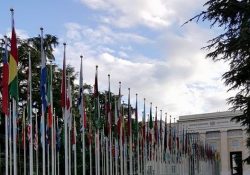WHA70: Statement of Knowledge Ecology International on Research and development for potentially epidemic diseases
On Wednesday, 24 May 2017, Knowledge Ecology International delivered its maiden statement to the World Health Assembly on the topic of research and development for potentially epidemic diseases. The intervention was read by Diane Singhroy, PhD.
Seventieth World Health Assembly (A70/1)
Agenda Item: 12.1.3 Research and development for potentially epidemic diseasesRep. Jan Schakowsky Questions Dr. Anthony Fauci on Zika Vaccine Price at House Energy and Commerce Subcommittee Hearing
On May 23, 2017, Rep. Jan Schakowsky, D-Ill., asked Dr. Anthony Fauci whether he believed the federal government should use “every tool” to ensure that Sanofi charges a fair price for a taxpayer-funded Zika vaccine that is being developed by the U.S. Army and funded by BARDA.
Dr. Fauci responded that he did not believe that the government had the “mechanisms” to guarantee an affordable price, even when the U.S. government and taxpayers have made a “major investment” in the development of a drug.
KEI has separately uploaded a short clip of the exchange between Rep. Schakowsky and Dr. Fauci:
Additional information on the Army-BARDA-Sanofi vaccine collaboration is available at /zika and /zika-timeline.
Video of the full hearing and copies of written testimony are available via the House Energy and Commerce Committee website: https://energycommerce.house.gov/hearings-and-votes/hearings/us-public-health-response-zika-virus-continuing-challenges.
Groups ask Army to reconsider decision that would allow French firm to charge U.S. anything it wants on federally-funded vaccine
23 May 2017
Groups ask Army to reconsider decision that would allow French firm to charge the US anything it wants on a federally funded Zika vaccine
CONTACT: Zack Struver, zack.struver@keionline.org, +1 (914) 582-1428
Andrew Goldman, andrew.goldman@keionline.org
James Love, james.love@keionline.org, +1 (202) 361-3040WHA70 – Side Event on Addressing Access Barriers and Affordability Challenges for Cancer Drugs – 24 May 2017
On Wednesday, 24 May 2017, Knowledge Ecology International (KEI), Oxfam and Stichting Health Action International (HAI) are convening a side event on addressing access barriers and affordability challenges for cancer medicines. This panel will take place in Salle IX of the United Nations Palais des Nations from 18:00 to 19:30.
Date: Wednesday, 24 May 2017
Time: 18:00 to 19:30
Location: Salle IX, United Nations Palais des NationsPanelists:
Berlin Declaration of the G20 Health Ministers
After at least eight rounds of negotiation, including two Geneva-based negotiations held on 12 May 2017 and 17 May 2017, the G20 Health Ministers meeting, convened in Berlin from 19-20 May 2017 issued the following declaration.
In relation to the R&D pipeline for developing new antimicrobial therapies, the G20 recognized “the importance of fostering R&D for new antimicrobials, alternative therapies, vaccines and rapid-point-of care diagnostics, in particular for priority pathogens as identified by WHO and for tuberculosis.”
Louisiana Governor John Bel Edwards Asks U.S. Army to Require Sanofi to Charge Reasonable Price for Zika Vaccine
The Louisiana Governor John Bel Edwards asked the U.S. Army to require Sanofi to charge a reasonable price for a taxpayer-funded Zika vaccine, in a letter dated May 10, 2017.
SCCR 32: IFLA on Orphan Works
>> IFLA: Thank you again Mr. Chair for allowing IFLA to take the floor. IFLA supports initiatives to support and make available cumulative knowledge and cultural heritage and recognize the role of libraries and archives in that respect. We further… Continue Reading
U.S. Army/Sanofi Zika Vaccine Collaboration Timeline and Update
Today I published a timeline on the collaboration between Sanofi and the U.S. Army regarding the development of a vaccine for the Zika virus.
One major issue that we have raised is on the price of the Zika Vaccine. KEI and other groups have asked the Army to ensure that Sanofi does not charge U.S. taxpayers a higher price than in other high-income countries. This is not a remote concern. Recently, we published a blog showing that Sanofi charges Americans four to eight times more for its MS drug Aubagio (teriflunomide) compared to other high-income countries. If Sanofi refuses to agree to a reasonable pricing provision, then we know that Sanofi wants to keep open the option of charging the United States the highest price in the world for a drug funded by American taxpayers.
The timeline provides the dates of several key events, such as the filing of patent applications, the dates of the Army/Sanofi CRADA and grants from BARDA, the signing of the Principles of Collaboration with the Oswaldo Cruz Foundation (Fiocruz), the publication of Federal Register notices on the intent of the Army to grant exclusive licenses on patents, responses by patient and public interest groups, the New York Times op-ed by Sen. Bernie Sanders and the response by Dr. Elias Zerhouni on behalf of Sanofi, and the letter from members of the House of Representatives.
Continue ReadingKEI Comments for 70th World Health Assembly Listening Session at DHHS
Today KEI attended the annual listening session at DHHS, when speakers are alotted no more than 1.5 minutes to speak on a specific agenda item, with no more than two agenda items per speaker. Our brief comments were focused on advancing the delinkage approach in the contexts of the GSPOA, CEWG, and cancer.
Experts, NGOs ask WHA delegates to support feasibility study of funding cancer research without high prices
On May 3, 2017, 29 civil society organizations and 33 health professionals, activists, and economists — including Nobel Prize laureate Joseph Stiglitz — asked delegates to the World Health Assembly (WHA) to support a feasibility study on the progressive delinkage of the costs of research and development from the price of cancer medicines. The groups and experts sent a letter to the delegates.
